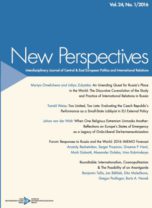“Germany”, Asset Class Contagion, and Contagious Stability*
“Germany”, Asset Class Contagion, and Contagious Stability*
Author(s): Sascha EngelSubject(s): Politics / Political Sciences
Published by: Ústav mezinárodních vztahů
Keywords: Eurozone crisis; contagion; austerity; virtuous fiscal policies; stability; social construction of markets
Summary/Abstract: In this paper, I examine the effects of socially constructed financial market lending patterns in the Eurozone crisis. Under the assumption that the crisis is one of sovereign debt, the term “contagion” is frequently used to describe the doubts about governmental debt repayment abilities that were spreading from Greece to Ireland and Portugal and then to Spain and Italy from 2010 to 2012. Consequently, austerity policies are indiscriminately applied to the governments of all five of these countries to ensure the countries’ sustainable growth for their debt repayment. This paper, by contrast, argues that “contagion” is the origin of peripheral repayment troubles rather than their effect. The Eurozone crisis is the result of the procyclical lending patterns of the European banking system, which turns liquidity shortages into solvency problems for governments depending upon debt roll-over operations. I then apply the related analysis to Germany’s funding situation during the crisis and argue that “stability,” i.e., the ability to maintain sustainable growth under Eurozone crisis conditions, is not the result of endogenous austere virtue. Rather, it is likewise largely a result of procyclical lending patterns: liquidity retracted from peripheral sovereign bonds is invested into core sovereign bonds. Moreover, I show that a similar effect has been in place prior to the crisis. “Stability” is as contagious as “contagion.”
- Issue Year: 23/2015
- Issue No: 1
- Page Range: 45-70
- Page Count: 26
- Language: English
- Content File-PDF

